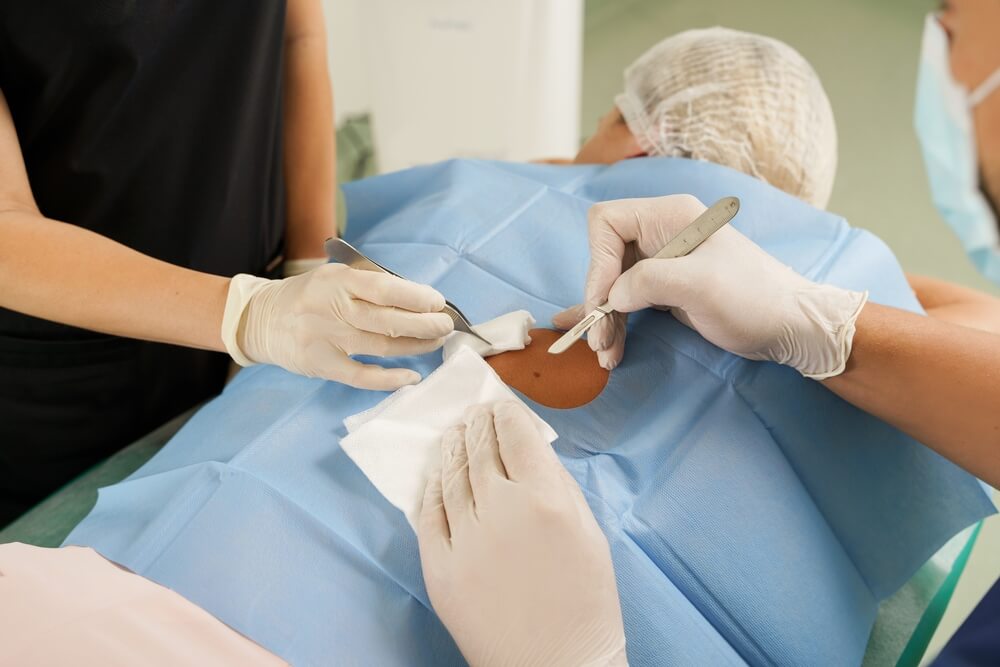Exploring the ins and outs of skin cancer surgery, from types of skin cancer to treatment options.
Skin cancer is a serious condition that affects millions of people worldwide. It is a type of cancer that develops in the skin cells and can manifest in different forms.
Surgery is one of the most common and effective ways to treat skin cancer, and it can be a life-saving procedure for those who are diagnosed with this condition. This blog post explores the different types of skin cancer as well as the surgical treatment options that Dr. Sally Ng offers.
Whether you or a loved one are facing skin cancer, or you simply want to know more about skin cancer surgery, we’re here to help you navigate and understand the world of skin cancer surgery.
Types of Skin Cancer

There are three main types of skin cancer: basal cell carcinoma (BCC), squamous cell carcinoma (SCC), and melanoma.
- Basal-cell carcinoma (BCC)
BCC is the most common form of skin cancer. It usually appears as a small flesh-coloured or white bump on the skin; however, it can also appear as a flat, scaly, red patch. This type of skin cancer is most commonly found on areas of the skin that are exposed to the sun, such as the face, ears, neck, and arms. BCC is slow-growing and rarely spreads to other parts of the body, but if it is left untreated, it may cause damage to the surrounding tissue.
- Squamous cell carcinoma (SCC)
SCC is the second most common form of skin cancer, and it either appears as a red, scaly, or thickened patch on the skin or as a raised, firm lump. SCC is most commonly found on areas of the skin that have been exposed to the sun for long periods of time, such as the face, ears, neck, and arms. However, it can also occur in other parts of the body if it is left untreated.
- Melanoma
Melanoma is a more aggressive and less common form of skin cancer. It appears as a pigmented spot or bump on the skin but can also appear as a non-pigmented spot or bump. Melanoma is the most dangerous type of skin cancer because it can spread to other parts of the body if it is not caught and treated early. Risk factors for melanoma include fair skin, a family history of the disease, and a history of sun exposure and sunburn.
Early detection is crucial in treating skin cancer, and if you are unsure of whether you may have skin cancer or would feel reassured having been checked, Dr. Sally Ng will gladly help.
Skin Cancer Treatment Options

Based on your assessment by Dr. Sally Ng and whether you have skin cancer, she will decide which treatment option is best when it comes to skin cancer surgery. Dr. Sally Ng offers surgical and non-surgical treatment options.
- Surgical
Surgical removal of skin cancer is the most common treatment option for skin cancer. The goal of the surgical procedure is to remove the cancerous growth along with a small margin of healthy tissue around it to ensure that all the cancerous cells have been removed.
Dr. Sally Ng performs the surgical removal of skin cancer while the patient is either under local or general anaesthetic. Once the skin cancer has been removed, the area is directly closed or reconstructed with skin grafts or flaps. Should a skin graft be used, it is done by removing a small piece of skin from one area of the body and using it to patch up the area that was operated on.
After the surgery, it is advised that the patient limit their movement to aid in the wound’s healing and to avoid exposing the wound to the sun.
- Non-Surgical
Non-surgical treatment for skin cancer is an option for treating certain subtypes of cancer or if the patient prefers not to be surgically operated on.
Non-surgical treatment includes a patient using topical creams on the affected area, however, this treatment cannot treat melanoma. The cream is applied to the area affected by either BCC or SCC over four to six weeks and clears the cancer cells by creating inflammation in the area.
Why Dr. Sally Ng?

Dr. Sally Ng is experienced when it comes to treating all types of skin cancer, as well as treating areas in which skin cancer may have spread. She is also the plastic surgeon lead in the skin and melanoma service at Austin Health, and she chairs the complex skin cancer multidisciplinary meeting at Waverley Private and Mitcham Private Hospital Network.
To read more about these services offered by Dr. Sally Ng, visit https://drsallyng.com.au/procedures/skin-cancer-surgery/.
Book an appointment by calling (03) 9587 2048.